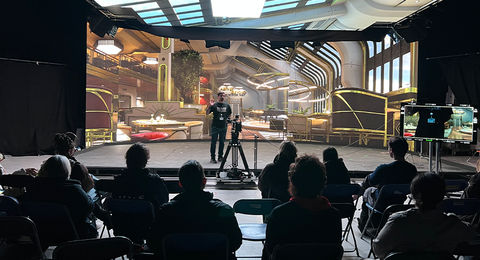
The world of film, television, and digital media is a fascinating one, with each project requiring a team of skilled professionals to bring it to life. While much of the spotlight falls on actors and directors, it’s the post-production team that plays a pivotal role in shaping the final product. A diploma in post production offers a comprehensive education in the art and technology of post-production, providing students with a range of skills that are highly valued in the entertainment industry. In this blog, we’ll explore the skills gained from a diploma in post production and how they prepare graduates for successful careers in film and television. We’ll also compare a diploma in post production with a BSc in animation and VFX to understand their unique offerings.
What is a Diploma in Post Production?
A diploma in post production is a specialized program designed to equip students with the skills and knowledge needed to work in the post-production phase of film, television, and digital media projects. This stage encompasses editing, sound design, color correction, visual effects, and more. The program focuses on both technical skills and creative techniques, allowing graduates to enter the industry with a well-rounded skill set.
Skills Gained from a Diploma in Post Production
Students who complete a diploma in post production gain a variety of skills that are essential for a successful career in the entertainment industry. Let’s explore some of the key skills developed during this program:
1. Video Editing Techniques
Video editing is a core skill in post production. Students learn to use industry-standard software, such as Adobe Premiere Pro and Final Cut Pro, to edit footage, create transitions, and piece together scenes to form a cohesive narrative. They also gain an understanding of pacing, timing, and storytelling through editing.
2. Sound Design and Mixing
Sound is a critical component of any film or television project. A diploma in post production covers sound design and mixing, teaching students how to work with audio tracks, add sound effects, and create a balanced soundscape. Students learn to use tools like Pro Tools and Logic Pro to achieve professional-quality sound.
3. Color Correction and Grading
Color correction and grading play a significant role in establishing the visual tone of a project. Students learn to adjust colors, enhance contrast, and create a consistent look throughout a film or television show. This skill involves using software like DaVinci Resolve to achieve the desired visual aesthetic.
4. Visual Effects (VFX)
Visual effects (VFX) are increasingly important in modern film and television. A diploma in post production introduces students to the basics of VFX, allowing them to create digital effects, composite scenes, and add CGI elements to projects. This skill is closely related to a BSc in animation and VFX, and provides a strong foundation for more advanced VFX work.
5. Project Management and Collaboration
Post-production often involves collaboration with multiple teams, including directors, producers, and other post-production professionals. Students in a diploma in post production learn project management skills, including how to organize workflows, meet deadlines, and communicate effectively with team members. These skills are crucial for ensuring a smooth post-production process.
Comparing a Diploma in Post Production with a BSc in Animation and VFX
While both a diploma in post production and a BSc in animation and VFX offer valuable education in the field of entertainment, they have different focuses and career outcomes. Here’s a brief comparison between the two:
Diploma in Post Production
- Focus: The diploma focuses on the post-production phase of film and television, covering video editing, sound design, color correction, and basic visual effects.
- Duration: Generally shorter (1-2 years).
- Career Opportunities: Graduates can pursue roles in film and television post-production, such as video editor, sound designer, or colorist.
- Skill Set: The skill set is practical and directly applicable to post-production work, allowing graduates to enter the workforce quickly.
BSc in Animation and VFX
- Focus: The BSc in animation and VFX delves into animation techniques and advanced visual effects. It covers a broader range of topics, including 3D modeling, character animation, and advanced CGI.
- Duration: Longer (3-4 years).
- Career Opportunities: Graduates can pursue roles in animation studios, VFX departments, and game design.
- Skill Set: The skill set is more comprehensive, covering a wider range of animation and visual effects techniques.
Choosing between a diploma in post production and a BSc in animation and VFX depends on your career goals and interests. If you prefer a shorter program that focuses on post-production skills, a diploma is an excellent choice. If you’re interested in advanced animation and VFX, a BSc provides a broader education.
The Benefits of a Diploma in Post Production
A diploma in post production offers several benefits that make it an attractive option for those interested in the entertainment industry. Here are some of the key advantages:
1. Quick Entry into the Industry
With a shorter duration than a degree program, a diploma in post production allows students to enter the workforce more quickly. This is ideal for those who want to start working in the industry without spending several years in school.
2. Practical Skills and Hands-On Experience
The program emphasizes practical skills and hands-on experience. Students work on real-world projects, allowing them to apply their skills and build a portfolio of work. This experience is invaluable when seeking employment in the industry.
3. Industry-Relevant Curriculum
The curriculum is designed to meet the needs of the entertainment industry. Students learn industry-standard software and techniques, ensuring they are well-prepared for post-production roles.
4. Career Opportunities
A diploma in post production opens doors to various career opportunities in film, television, and digital media. Graduates can pursue roles such as video editor, sound designer, or colorist, among others.
Conclusion
A diploma in post production provides the skills and knowledge needed to succeed in the competitive world of film and television. With a focus on video editing, sound design, color correction, and basic visual effects, students gain a comprehensive education that prepares them for various roles in post-production. Whether you’re interested in film editing or television sound design, a diploma in post production offers a pathway to a rewarding career in the entertainment industry.


